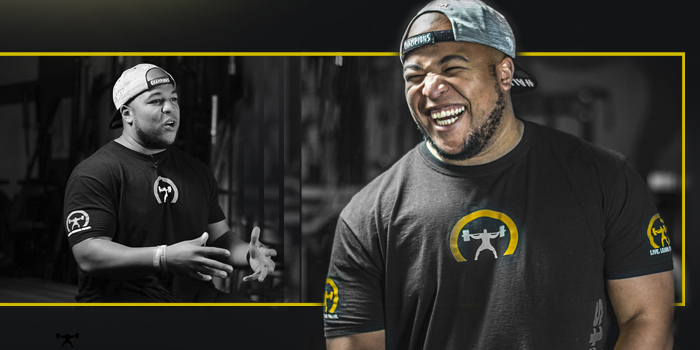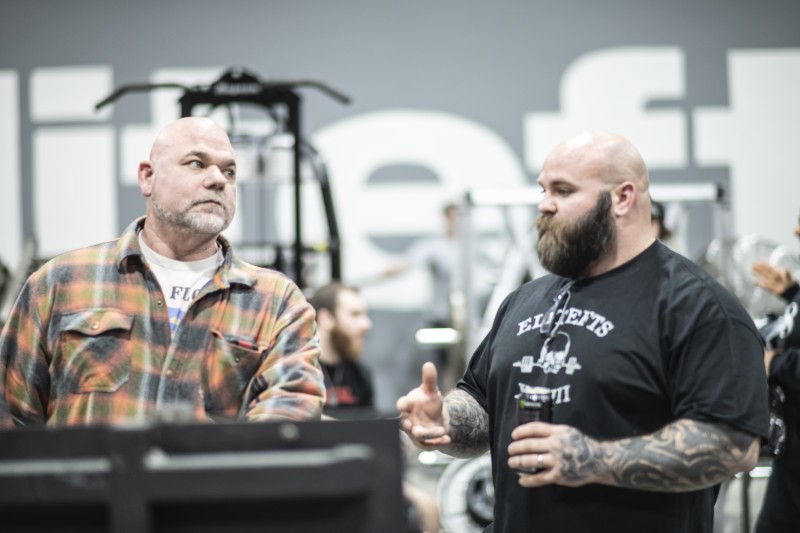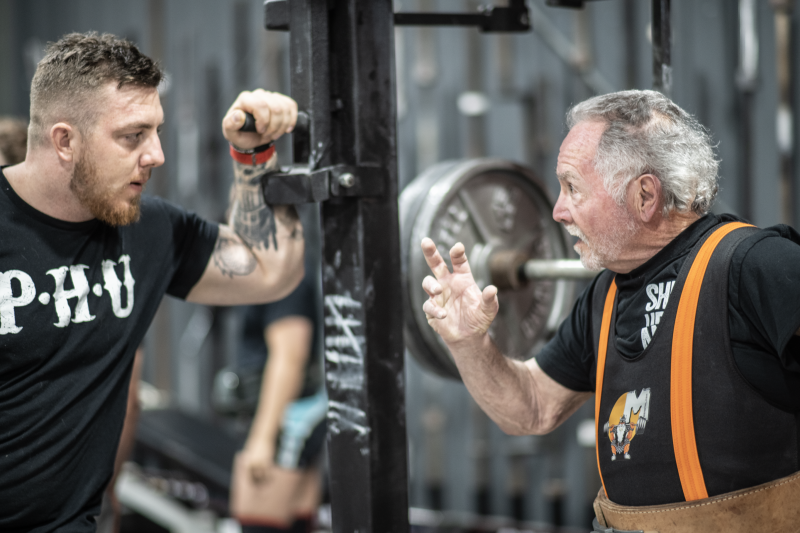
Recently, as many of you who read my articles know, I’ve had some big revelations come about in my life. Not only have I opened up my relationship with God, but I’ve also spent a lot of time diving head first into leadership development. Through all of this, I’ve been able to sit back and think about my life through new eyes and look into what I would call some of the most important lessons I’ve learned. I wanted to take the time to share these things with you all in hopes that something I say may have some relevance in your life.
LISTEN: Men of Strength Sports Performance Podcast #2: Bret Huth and Scott Salwasser
1. Coach Them Hard, Love Them Harder
This one I’d say is a mixed bag of lessons that I’ve learned throughout my whole career. As you go through your own journey, you’ll probably start off one of two ways. You’ll either be Billy Badass, or you’ll be Buddy Barney. At the beginning of your career, you’re like a brand-new puppy. You don’t really know what to do, or what’s right or wrong, so you kind of just go with instinct, or maybe what you think is right. This is true for all of us.
I know for me, I was Buddy Barney. I looked like the players, I talked like the players, and for the most part, I acted only a little bit better than them. My coaching was very abrasive but very love you up. It was all over the place. The things I said and did, oh boy.
As I got through my career, I became more professional (thank God) and really worked hard on holding kids accountable. I personally hate confrontation (I know, weird since I’m a strength coach), but what my immature mind used to see as “being a dick,” I grew up and began to hold kids accountable because I love them and want the best for them.
I coach extremely hard, and I can at times become monotonous with my attention to detail on certain things (I know myself), but I also love my players hard. I congratulate them when they do good, and I tell them, “good job” (I know, soft) when they do something good, and I genuinely try to be in their lives outside of wins, losses, and weight room PRs. That, to me, is the art of coaching.

2. It’s OK to Not Know
I was so obsessed with gaining all the information I could take in. I never wanted to be caught off guard or sound dumb in a conversation or argument.
Then one day, things changed. Nowadays, I really don’t care to argue programming unless it’s directly brought up. I don’t like Olympic lifts, but here’s what changed: I realized what I like or don’t like doesn’t really matter. I let go of my arrogance and realized it’s what’s best for the kids and what the bosses want (or director or head ball coach, depending on your role).
At the end of the day, everything pretty much works to a certain point, so how can I judge if you’re right or wrong? That’s up to you.
As far as getting caught with my pants down in a conversation, there’ve been plenty of times where I either have no clue what’s being discussed or I don’t have an answer. And that’s OK! If that situation occurs to you, say this: “You know, I don’t know that answer, but I’ll point you to someone who does, or I’ll find out that for you and get back to you.”
It’s not a crime to not know something. I’m 27 years old; there’s going to be a lot I don’t know, and the crime is to not find out once you realize an area of knowledge is missing.
3. Don’t Complicate the Uncomplicated
I used to think so hard about programming. When I first went to American University and worked track and field, I was worried. When I first programmed softball at Robert Morris University, I was also worried. I knew speed and agility stuff like the back of my hand (at that point, anyway, in my mind), but the periodization for a non-football sport scared me.
Since I’ve been at my current role at Georgia Southern, I’ve programmed summer training for freshman and walk-ons (two things I haven’t ever done). Now, my mindset with that was night and day different from my first time programming out softball for a weekend straight. I took about two seconds, made a needs-analysis (within what my boss wanted), and wrote out my sets and reps for the time frame I had. It was very uncomplicated.
Walk-ons were the same thing. Both programs were different, and both programs were things I’d never done. Basically, programming freshman was triphasic-esque, and programming walk-ons was a West Side-esque type in a two-day form; one was a max effort day, and the other one was a dynamic effort day.
So why was I not shaking my boots like before? Because I kept it extremely simple. Experience had taught me the basics, and time on the job had taught me, “Bro, it’s pretty uncomplicated. Just don’t be an idiot and follow your guidelines.”
When I was younger, I was too worried about every little detail. Literally, I’d sit there and say, “OK, I need to make sure I have 2:1 pull:push, a shoulder, a hamstring, a shrug, a VBT movement, an Olympic variation, an overhead press, and basically every inch of every body part covered.”
Now if I have more than five exercises in an individual lift, I get pissed at myself for overthinking (target is five to seven, excluding neck and mobility exercises). Why? Because it’s not that complicated, especially in a Tier System-type program. Keep it simple, stupid.

4. Arrogance is the Enemy
Or at least arrogance was my enemy. Knowing everything and telling anyone that will listen that you know everything is completely different. Quiet confidence is the best confidence. Not that everything different is wrong; it’s just different — unless it actually is wrong. I mean, my arrogance was so bad it kept me from having a relationship with God because I didn’t want to rely on anyone else.
Yes, re-read that and see how much of a problem I had. I’m Don Day, and I was an arrogant SOB. This held me back in a lot of ways. It was hurting me from fully learning anything that was foreign, it was hurting me in social settings, and most importantly, it was hurting me in leadership roles. I have said numerous times I truly believe I am a good person, but most of what I tried to do was being fed with arrogance, so the fruit was corrupted.
5. Always Have High Character, High Competency and Stay Consistent
This has been something that was a huge learning experience in my career. I have worked hard to have high competency and have had to work even harder to stay consistent in my character. That’s the challenge. The deeper lesson to me isn’t being a man of character, which was a gift from my family, but staying consistent through troubling times was something I had to learn through life and through faith. We all have our hard days, it happens, and no one is going to go through life without hitting bumps in the road.
In these times, it’s important to remember what keeps you consistent. For me, it’s remembering my purpose and my faith, which are tied with impacting people’s lives, using the gifts given to me God, and trying every day to be a great ambassador for Christ (the second part being my biggest struggle in life). So when things are tough, I really try to remember both parts of that.
When adversity strikes me, and I start to slide off that balance beam, I think to myself, “Hey, no one can take away my ability to make an impact on lives around me. Don’t let my character fall. Be who God wills me to be.” I promise you it’s not as easy as I make it sound; it’s actually extremely tough for me. But I work on it every day, and I constantly have to remind myself to stay consistent (I actually repeat it in my head until I become level again).
READ MORE: Rise Out of the Ashes
These are just a few things that I have learned, but I believe they are probably amongst some of the most important things that I have learned in my six or so years in the coaching profession. I hope that you have things that you can take away from the lessons I’ve learned and will hopefully make an impact on your careers. The most important part of all of these that I forgot to mention though is that none of those things I learned solely on my own. The coaches I’ve been around and been under have helped me learn a lot of those lessons or taught me them. I’ve really been blessed to be around some great leaders, and I truly appreciate them for helping shape me into the man and coach I am today.











1 Comment